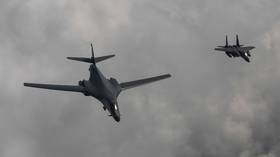UN chief sounds nuclear war alarm
Antonio Guterres has warned that the risk of a catastrophic conflict is at the highest level since the USSR collapsed
Technological advances and escalating geopolitical tensions are imperiling the global population with the highest risk of a nuclear conflict since the Soviet Union broke up in 1991, UN Secretary-General Antonio Guterres has warned.
“Humanity is on a knife’s edge,” Guterres said in a recorded speech presented on Friday at the annual Arms Control Association meeting in Washington. “The risk of a nuclear weapon being used has reached heights not seen since the Cold War.”
The UN chief claimed that countries are engaged in a “qualitative arms race,” employing such technologies as artificial intelligence (AI) to boost their readiness for a potential conflict. Such advances are “multiplying the danger” of nuclear weapons being used, he added, and the last remaining arms control agreement between the US and Russia is heading toward expiration in 2026.
Guterres made his comments as US support for Ukraine in its battle with Russia stokes fears of a wider, and potentially nuclear, conflict. The US and other NATO members have accused Moscow of nuclear saber-rattling, while Russian leaders have pointed out that deepening Western involvement in the Ukraine conflict could trigger an escalation.
“We are not brandishing (nuclear weapons),” Russian President Vladimir Putin told an audience at the St. Petersburg International Economic Forum on Friday. He reiterated that Russia would only consider using nuclear weapons in the event that its sovereignty or territorial integrity were under threat, and added, “I do not believe that is the case now.”
While Putin insisted that Moscow has never been first to use aggressive nuclear rhetoric, Guterres suggested otherwise: “Nuclear blackmail has reemerged with some recklessly threatening nuclear catastrophe.”
Nuclear-armed states must lead the way in forging new nonproliferation commitments, the secretary-general said. He called for a reaffirmation of a nuclear test moratorium, a pledge not to launch a first strike, and for the groundwork to be laid for a successor to the New START agreement before it expires. The major powers also must address the threat of AI by agreeing that any launch decisions are “made by humans, not machines or algorithms.”
In 2022, US President Joe Biden approved a new national defense posture that leaves the door open to a possible nuclear first strike by Washington. He broke a pledge made during his 2020 presidential campaign to narrow the potential uses of America’s nuclear arsenal, instead doing the opposite.
China has called for a “no-first-use” treaty and has ruled out launching a first strike. US officials responded by questioning Beijing’s sincerity, given the alleged buildup of its nuclear weapons program. Moscow has suspended its participation in the New START accord, citing US statements on bringing about the “strategic defeat” of Russia by arming Ukraine.






Comments are closed.